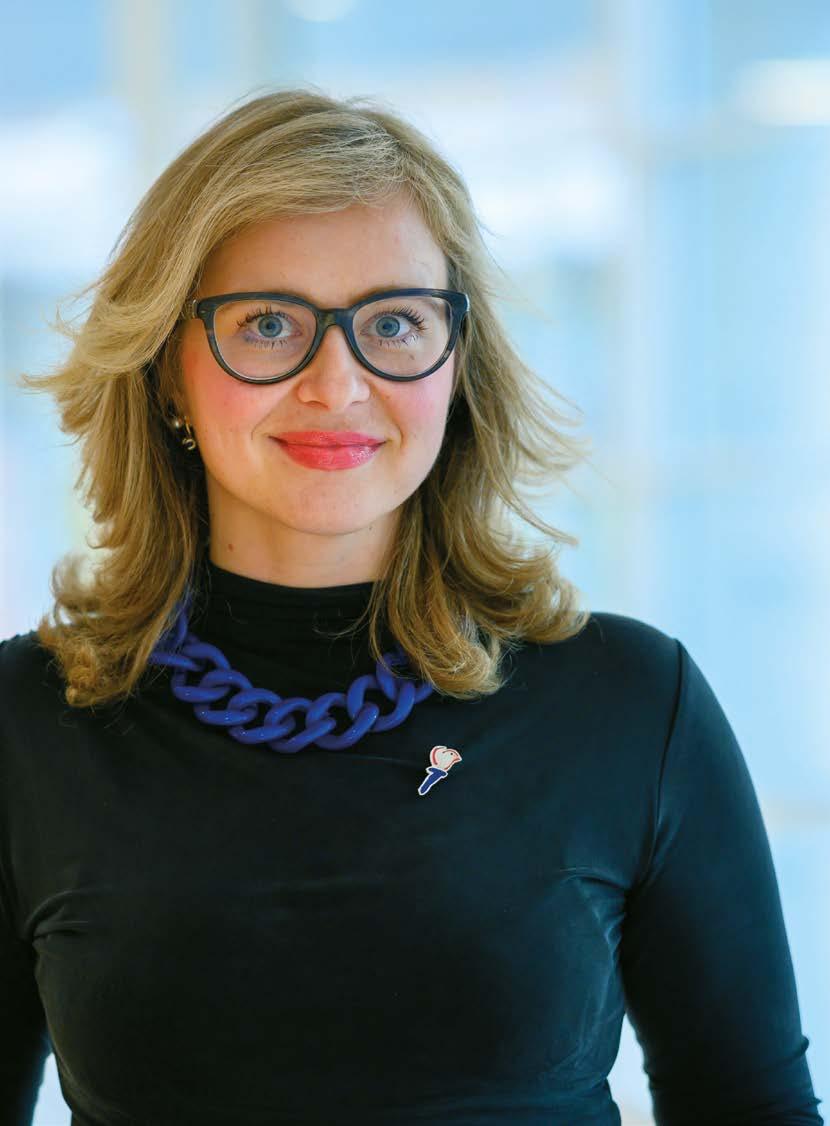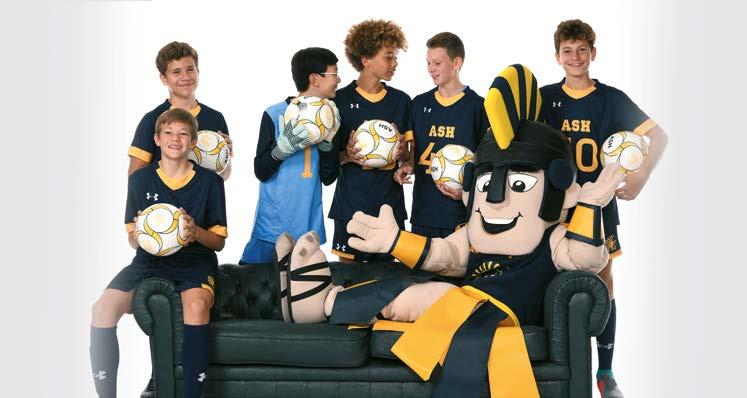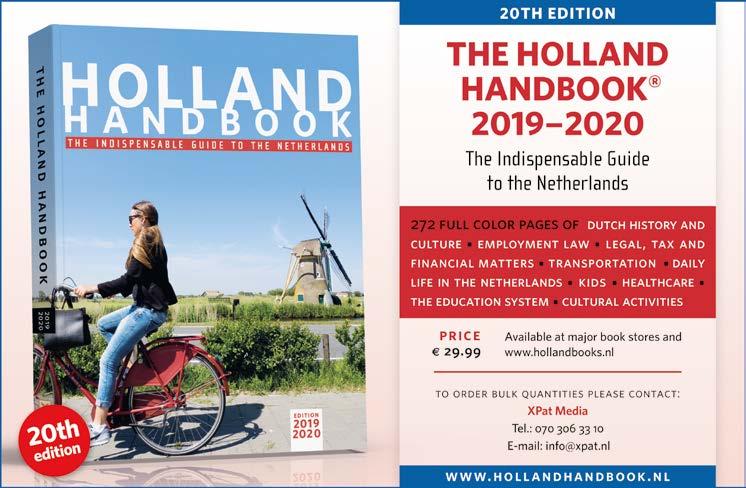
10 minute read
INTERVIEW
FROM THE POINT OF VIEW OF... In the articles entitled “From the Point of View of…” we tell the story of an expatriate who is living in the Netherlands. In each edition, we interview this expatriate, each time from a different country and each time in a different position (the person who was placed here by the employer, came here on his or her own initiative, the family members, etc.) For this issue of The XPat Journal, we spoke with Leila Prnjavorac, from Bosnia and Herzegovina, who came to the Netherlands as a child, as a refugee from the Yugoslav War.
Leila Prnjavorac
Advertisement
In a world populated by people who feel that life has let them down, failed to meet its promises and now owes them, it is reassuring to meet someone who has seen her share of suffering, yet sees each new day as an opportunity to connect with others and to help others see what is worth appreciating about others and life.
Photo: Arnaud Roelofsz L eila Prnjavorac was born in Doboj, a city in current Bosnia and Herzegovina, at a time that it was still part of what was called Yugoslavia. “We all lived side by side; Catholics, Muslims, Jews, people of Orthodox religion. We celebrated each other’s religious feasts; the Muslims had a Christmas tree at the end of December, and hid Easter eggs in the spring. The Catholics and Orthodox joined the Muslims for the Festival of Breaking the Fast – there was a spirit of mutual acceptance, of companionship. I never saw us as part of specific ethnic or religious group.”
Hatred “And then, one day, people started pointing at us, saying ‘Death to the Turks!’. I looked up at my mother and said, ‘What Turks? Why are they pointing at us?’ And my mother answered: ‘They mean Muslims, and they are still mad at us for what the Ottomans did hundreds of years ago.’ That afternoon, I was given a speed lesson in history, right there on the street. What this taught me is that hatred, if you let it, becomes a poison that can upset society if we don’t make a conscious effort to heal from it. And that we need to see people as individuals, rather than as members of a reli gious or ethnic group, because though religion can be used as a means to unify people it can also be used to drive them apart. Sharing other people’s experiences in war as a Free dom Ambassador here in The Hague, I have learned that war doesn’t just come about all of a sudden; it is a gradual process that people are led into. Often they are not aware of it and then all of sudden they are in it so deep that they don’t dare go against it, even though it is not something they signed up for. Which is why it is important to never stop thinking for yourself, and to never lose touch with your conscience, with who you are, or what you believe is right.”
War “One day I was up in the hills with the girl next door and her aunt and uncle, and we were playing in the mead ows. All of sudden, we saw dozens of men, rushing across the meadow, who said to us ‘You have to go, the war is starting!’ We had no idea who they were or what they were talking about, but we rushed back to the city and when we got there, I breathlessly told my parents ‘The war is beginning!’. But they chose to stay, because they just couldn’t fathom that there would really be a war – that from one day to the next, their best friends and their neighbors would become their enemies. A few weeks later, my father was passing the check point to go to his work, when he was stopped. They asked him for his passport and were set to give him a hard time, when a befriended Serb interfered and said: ‘Don’t. This is a good man.’ He was given back his ID card, but as he walked on, some one fired a shot right over his head. ‘They are never good enough’, the shooter said. That was my father’s last day of work and my last day of school.” Spider in the Web “My mother was a very wise and enterprising woman. As soon as she understood that there really was going to be a war, she took an empty wheelbar row to my uncle’s patisserie in the city and filled it with flour, butter, honey and sugar. She knew that it would no longer be of any use to him and that we, and the people around us, would be needing it. During the war, she be came like a spider in the web of our neighborhood, distributing medicine, helping with personal hygiene, dispensing information, cutting people’s hair and sharing the food she had gotten. I always marveled at how she knew who needed what.” Leila reflects: “Though there was a war, these were also some of the most valuable months of my life; what I saw, showed me how kind and compassionate people are – everyone shared whatever they could and they would never let us leave with empty hands. When there is so much uncertainty and fear, and no one has anything anymore, everything changes; there is no more social status, money doesn’t make a differ ence – everyone becomes equal and everyone wants to ‘Hatred, if you let it, becomes a poison that can upset society if we don’t make a conscious effort to heal’
survive the day. What you share is love and hope, and the desire to give and to give back. For instance, one day, we went to visit a family in the hills who had a beautiful strawberry patch full of ripe, juicy strawberries. In order to be able to do something back for us, they gave me the only thing they could share; a red bucket, which told me to fill as full of strawberries as I could, to take home.” For a moment, Leila stops, then continues: “At the end of the day, they invited us to spend the night, instead of making the long walk back – which was not without risk for a woman alone and her little daughter – but my mother wanted to get back to my brother, who did not know where we were. Later we heard that that very same night, Serbs had come and killed the entire family. If my mother hadn’t insisted on going home that night, we would be dead now.”

Equal “My mother discussed very profound things with me and treated me like an equal, answering my questions honestly. Mind you, she never showed me her fear; she car ried her own fear inside her, and bore mine as well. When we were hiding one night during a razzia, we heard screaming next door as a neighbor was raped and her hus band was beaten – in front of their children. Instead ‘protecting’ my innocence, my mother told me what had transpired, because she wanted me to be aware of, and prepared for, what could happen to us. And it was this knowledge that later once again rescued us.” Leila explains: “After a few months of war, my mother and I went back to the barber shop, to see if it was still standing. We were barely inside when a Serb soldier ap peared, drunk and carrying several guns. He asked my mother for a haircut, but I could tell that there was some thing threateningly intimate about how he was looking at her. And I thought about that other woman. I sidled up to him and started asking him about his guns – how did he know which bullets went into which gun? How did they work? What were they for? I kept him busy and distracted, as my mother did his hair. And when she was done, I knew I had to get him out of there. So, I asked him, ‘Could we go outside, so you could show me how they work?’ Which he did. In the end, he found me en dearing, which took away the edge and made him see my mother and myself in another light. He showed me a few more things, let me hold one of his guns, and left.” ‘My mother never showed me her fear; she carried her own fear inside her, and bore mine as well’
Lightness Is there a specific conversation that Leila had with her mother that stands out to this day? Leila answers: “One of the things my mother taught me was that everyone
8 | the xpat journal | 2020 carries their own pain and sorrow inside them that could cause them to act or behave in a way that is damaging to themselves too. She told me that we should look at each other with love, compassion and openness. Her actions during those months showed me that one good deed is enough to restore your faith in your fellow human being and that you should continue to engage from a position of hope and trust, because if you lose that, then life loses its lightness.”
Flight Eventually, Leila’s family had no choice but to leave. As part of the efforts at ethnic cleansing, they were loaded onto a bus and taken to Belgrade. There, her father was recognized by someone who had known him from before and who offered to send him an official ‘invitation’ to vis it her in Holland. As soon as this invitation arrived, they left for the Netherlands, where they requested asylum. Did they ever see her again? “Decades later, my daugh ter was attending a Bosnian school in the weekends in Rotterdam and one of the teachers who was helping out there approached me one day and asked; ‘Are you Leila, from Doboj?’ I said ‘Yes’ and she answered, ‘My sister is the one who helped you come to Holland. Just this week, she found your old passports and was wondering what to do with them!’ She told me that they had a date to go to the theater that same night and we decided to surprise her. It was a very emotional reunion and it was like find ing a long-lost member of the family.”
Precious “And that is what makes life to precious, you can lose everything, but you can get it all back – just in a different package. It is very degrading to be told that you belong to a group that needs to be cleansed, and it is a very valu able realization that you are worthy, after all. Despite all that has happened to me, and also thanks to all that has happened to me, life is precious. And though, for a long time, I went through life safe in the knowledge that I have my own back, I have learned that it is just as valuable to receive. Provided this is done on the basis of equality – and not on the basis of the giver being superior. No one chooses where they are born, things happen to us and no one is perfect. But everyone can try to make a new start, and learning to receive will help you circle back to who you are, which will make you stronger.”
LVision Leila has founded her own company, LVision, and works together with adolescents and students. “We discuss how important it is to see ourselves and others – and to honor boundaries. I make them aware of how privileged they are to live in a country where they have the freedom to explore, but that they also still have the responsibility to treat each other with respect, both online and offline.” She also works as a speaker, presenter, project coordina tor and trainer for NGOs, municipalities, government organizations on a great variety of subjects.
Become Part of Our Story

#ASHexperience #thejourneymatters











